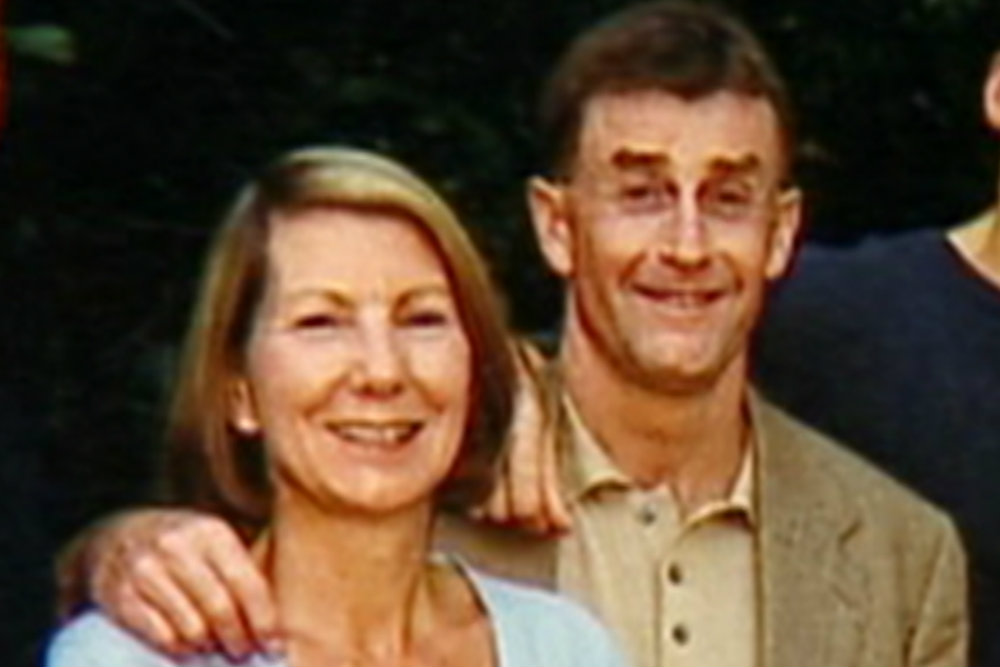Who was Kathleen Peterson? According to the true crime documentary series The Staircase, currently streaming on Netflix, she was a successful telecoms executive and the matriarch of a large, seemingly happy blended family with second husband Michael Peterson, before her untimely death at age 48. The way her widower/possible murderer Michael tells it, she was also accepting of her husband’s bisexuality and remarkably permissive of his desire to go outside their marriage to have sex with men.
Other than that, who was this woman who was found in a pool of blood at the bottom of the staircase in her North Carolina mansion in 2001? The Staircase doesn’t seem particularly concerned with this question. Like a supporting female character in a mafia movie, the Kathleen presented in the crime doc had no interior life of her own and existed only to know other people, namely her husband and likely killer Michael, a novelist, former local newspaper columnist, and failed mayoral candidate who lied about injuries he supposedly incurred while serving in Vietnam; Clayton and Todd, Michael’s two adult sons from a previous marriage; Martha and Margaret, the daughters he adopted after the 1985 death of his friend Elizabeth Ratliff; and Caitlin, Kathleen’s own daughter from a previous marriage.
The original series, which aired on Sundance TV in 2005, positions Kathleen’s possible murder as the inciting incident that propels eight episodes embedded mostly within Michael’s legal team as they plot the novelist’s defense and relay courtroom footage from his murder trial. As the case unfolds, Kathleen becomes a footnote in the story of her own death. Her gruesome demise—found dead at the foot of a staircase with four large lacerations to her skull amid a pool of her own blood—is presented as a high-stakes but inconvenient puzzle to be solved with the aide of a pricey legal team, lest Michael end up in prison.
The way Michael tells it, he and his late wife were hanging out by the pool drinking wine and celebrating a possible movie option for one of his novels when an inebriated Kathleen returned to their palatial house, tripped on her way up one of its two staircases, fell, hit her head, and bled out. Law enforcement believed Michael beat Kathleen to death at the foot of the stairs with a blow poke after she discovered emails from a rent boy on their shared computer. Later installments suggest that Kathleen could have been the victim of a rogue owl (really). Bolstering the murder theory is the revelation that Peterson’s friend Ratliff was also found dead and awash with blood at the bottom of a staircase in Germany 16 years prior. That death was originally ruled accidental, but during the Kathleen Peterson murder trial Ratliff’s body was exhumed and her death determined to have been caused by blunt force trauma. Michael Peterson was the last person to see each woman alive.
Cops, journalists, and other ostensible seekers of truth would claim they don’t believe in coincidences. To the viewer, Occam’s Razor should reasonably fall on Michael as the killer, but The Staircase is a documentary fraught with ambiguity. If Michael is no angel, than neither are the public servants tasked with putting him away. Director Jean-Xavier de Lestrade, who is also trained as an attorney, makes a point to highlight the prosecutors’ apparent homophobia. At one point, then-Assistant District Attorney Freda Black addresses the jury, pointing to Michael’s history of having sex with men as an act of depravity and an indication of violent criminality.
“And then there’s Brad … People like Brad … Now … do you really believe that [Kathleen Peterson] knew?” Black asks, referring to a male escort with whom Michael corresponded. “Does that make common sense to you? … And I don’t mean to offend anyone, but he did say they were going to have anal sex … Filth. Pure filth.”
Black’s Southern accent approaches Foghorn Leghorn proportions as she leans into her disgust at the thought of men having sex, but the most egregious miscarriage of justice occurs later, in episodes filmed in 2011 and aired in 2013, when the crime scene investor on whose blood spatter analysis the prosecution’s case relied was fired after it was discovered that he had lied repeatedly to juries about evidence he collected at crime scenes and was responsible for at least two innocent men receiving life sentences for murders they didn’t commit.
Of course, law enforcement can be corrupt and Michael can be a murderer—the two concepts aren’t mutually exclusive, no matter how biased The Staircase is in Michael’s favor. And Lestrade tips his hand when it comes to the facts he obfuscates, or leaves out entirely, like the motive inherent in Kathleen’s 1.4 million dollar life insurance policy weighed against the couple’s six-figure credit card debt and the anxiety Kathleen, as the couple’s primary breadwinner, felt over her seemingly imminent layoff.
Then there’s the matter of Michael’s love affair with the show’s editor, Sophie Brunet, a relationship Lestrade claims had no influence over the flattering edit, though it was never revealed in the series itself. “This is one of the incredible things that happened during those 15 years. Life is really full of surprises,” Lestrade told the French publication L’Express. “They had a real story, which lasted until May 2017. But she never let her own feelings affect the course of editing.” Nevermind the complicated ethics of it all, that the viewer never knows about the romance feels like an odd and purposeful omission from a docu-series. If anything, it can only call to question what other worthwhile information might be lingering behind the scenes.





